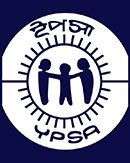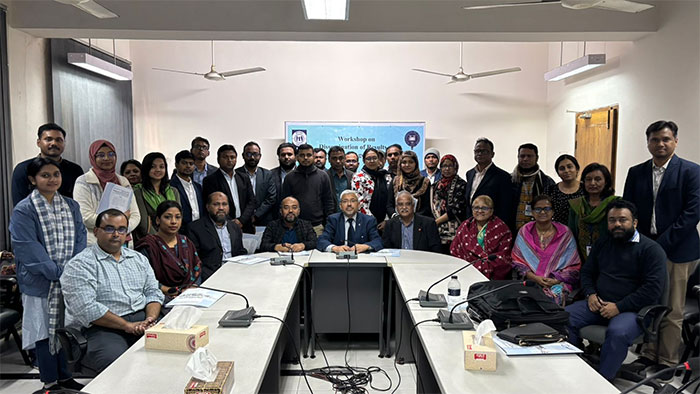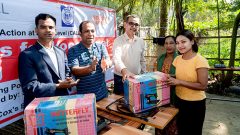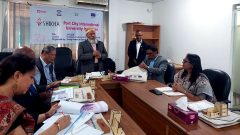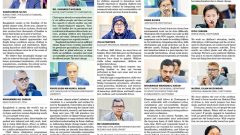YPSA has been implementing care and support programs along with livelihood program for the elderly people in Sitakund for a long time. Since the number of the ageing people has been growing higher in Bangladesh which poses an inevitable future of having an ensuing challenge to deal with huge percentage of elderly people by 2050, YPSA’s approach is to find the knowledge gap and garner data as much as possible to contribute to establishing a welfare approach for the ageing people in Bangladesh.
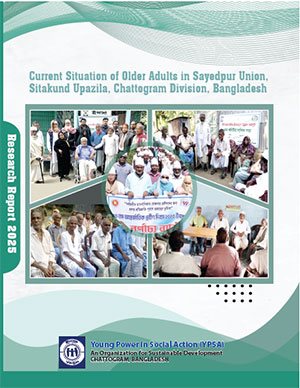
In this context, research has been carried out on understanding the rural ageing population to gather evidence and lived experience of older adults. To disseminate this research results, a workshop was held on 23 December 2024 at Center for Advance Research in Sciences (CARS) auditorium in University of Dhaka, Bangladesh. This research is titled as “Current Situation of Older Adults in Sayedpur Union, Sitakund Upazila, Chattogram, Bangladesh” focusing on YPSA’s Ageing Project from 2020-2024. This study has been authored by Professor Hafiz T.A. Khan, Professor of Public Health and Statistics, University of West London, and Professorial Fellow, The Oxford Institute of Population Ageing, University of Oxford, UK; Md. Arifur Rahman, Chief Executive, YPSA Bangladesh; Morshed Hossan Molla, Manager (M and E and Research), YPSA Bangladesh; and Dr. Ahbab Mohammad Fazle Rabbi, Assistant Professor, Department of Population Sciences, University of Dhaka, Bangladesh.
The workshop began with the welcome speech by Md. Nazmul Haider, Assistant Director, YPSA. In his speech he mentioned the height of significance of this research implying that this research shows the various aspects of the elderly people as well as the consequences brought up by the four years project of YPSA for elderly people. After his speech, he welcomed Professor Hafiz T.A. Khan for delivering his keynote speech. Professor Khan illustrated that “this study is to gather evidence on lived experience of older adults in rural Bangladesh to recommend sustainable solutions”. He also focused on the global situation of the ageing people, rural ageing populations, sustainable care and support systems to older adults in the rural areas, the role of NGO like YPSA in understanding the situation of older adults and implication of the key findings for designing policies in his elaborative presentation to the participants.
 Later, the research findings were shared by Morshed Hossan Molla encompassing the study focus, objective, methodology and key findings related to characteristics of 866 respondents of the research with the age group of 60 – 65 years, social care and support for older adults, health and well being of the respondents, social participation and daily activities of older adults, social pension of the well being of older adults and prevalence of dementia in rural Bangladesh.
Later, the research findings were shared by Morshed Hossan Molla encompassing the study focus, objective, methodology and key findings related to characteristics of 866 respondents of the research with the age group of 60 – 65 years, social care and support for older adults, health and well being of the respondents, social participation and daily activities of older adults, social pension of the well being of older adults and prevalence of dementia in rural Bangladesh.
A follow-up ‘open discussion’ was facilitated after Mr. Molla’s research findings sharing presentation, led by Dr. Ahbab Mohammad Fazle Rabbi. In the interactive open discussion session, several participants highly appreciated the research findings and expressed their lauded opinions on how this research findings could contribute to exposing the real situation of the elderly people of Bangladesh under the social gerontology literature. Some recommendations were made to expand the future research focus on elderly from every socio-economic groups in Bangladesh, understanding the public health concerns deeply including dementia, Alzheimer and other co-morbidity issues of the ageing population in Bangladesh, approaching more policy issues regarding elderly care etc.
 Other participants included Afsana Karim, Adviser of CIPRB in the Developing Geriatrics Care Giver Training Centre, Tariq Mohammad Ali, Deputy Director, Kazi Md Jamshed, Assistant Professor of University of Dhaka, Md. Azizul Haque, Founder and Secretary General of Dementia Care, Dr. Md Nazrul Islam, Medical Director, Home Dialysis Therapy Center, Kamrul Islam, Deputy Manager, Invent Technologies Limited, Hosne Ara Khan, volunteer in Alzheimer Society of Bangladesh, and others.
Other participants included Afsana Karim, Adviser of CIPRB in the Developing Geriatrics Care Giver Training Centre, Tariq Mohammad Ali, Deputy Director, Kazi Md Jamshed, Assistant Professor of University of Dhaka, Md. Azizul Haque, Founder and Secretary General of Dementia Care, Dr. Md Nazrul Islam, Medical Director, Home Dialysis Therapy Center, Kamrul Islam, Deputy Manager, Invent Technologies Limited, Hosne Ara Khan, volunteer in Alzheimer Society of Bangladesh, and others.
Later, Professor Khan thanked all for participating in the workshop and presented his closing remark by expressing gratitude to YPSA and how the research would be helpful to develop a sustainable health and well-being plan for the elderly to contribute to the protection of them in Bangladesh. He appreciated all the recommendations stated by the workshop participants and stated to incorporate for future concerns.
